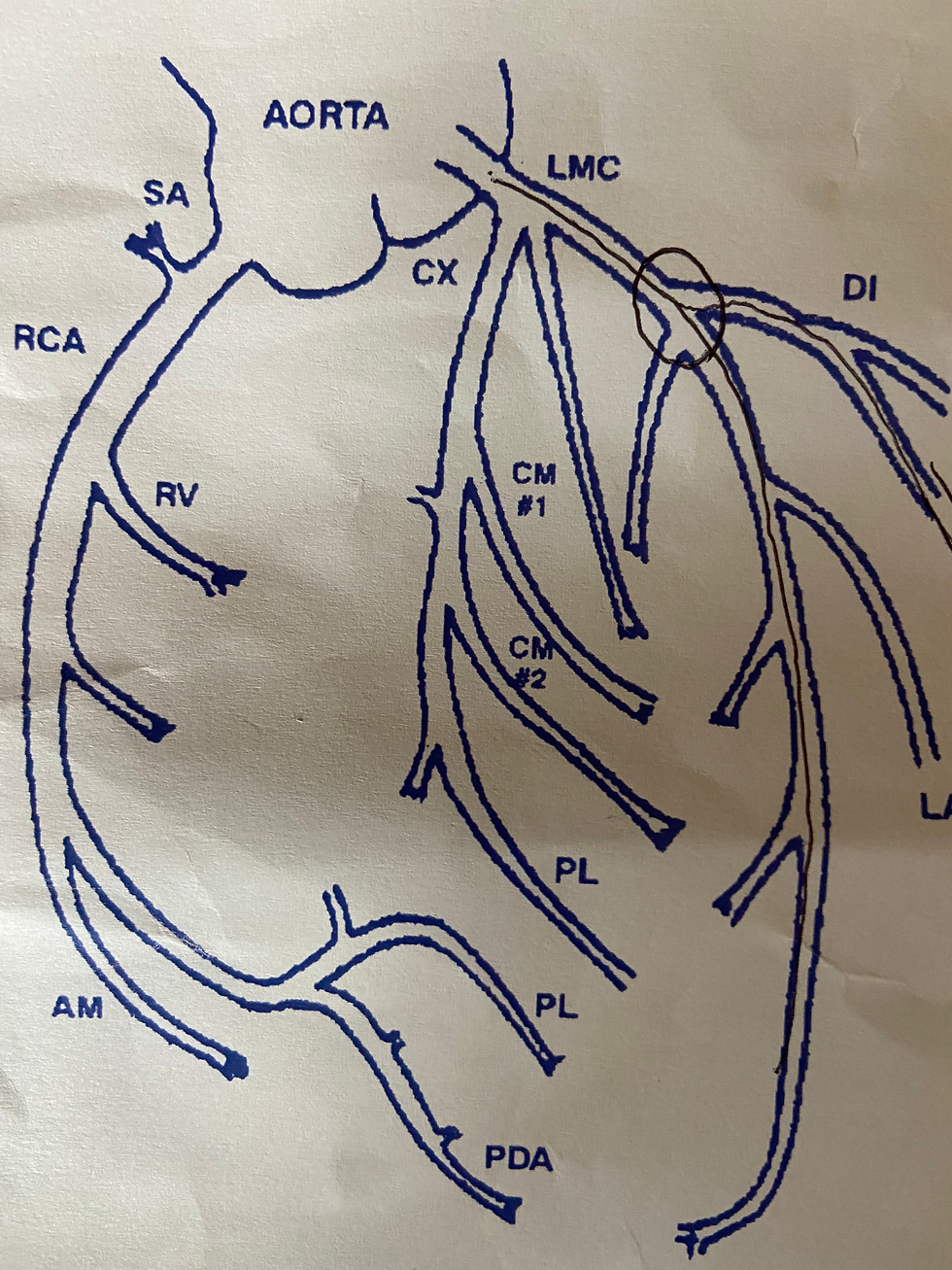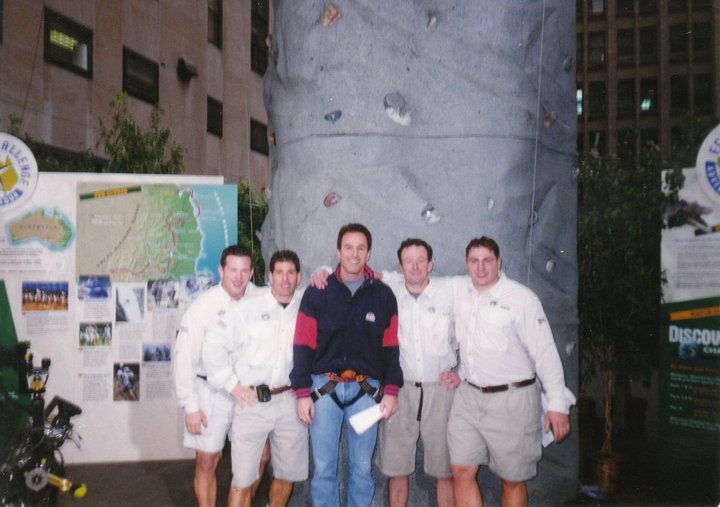The Heart Is More Than a Muscle
- Chris Pace

- Aug 28
- 6 min read
Today marks three years since my heart attack.
My doctor drew a simple circle showing where my "widow maker" was blocked. That drawing became both a wake-up call and a roadmap for how I approach leadership and life.

At first, I blamed that moment for everything I wasn't doing in my career. In some ways, rightfully so. I wasn't as present as I needed to be. I wasn't pushing forward with the same intensity I once had. And I felt increasingly irrelevant in a field that never slows down, especially as someone who had always been the most energetic person in the room.
But over time, I realized it couldn't remain just an excuse. It had to become a turning point. Like every obstacle I had overcome in my career. This morning, I ran 10 miles, the distance I would typically run. But everything about how I approach that run, and how I approach leadership, has fundamentally changed.
The heart is more than a muscle. It's also where leadership starts.
Early Lessons That Stuck
At my first office job at a pharmaceutical advertising agency, an EVP shared two pieces of advice that have shaped my entire career:
"You can be a totally different person in three years. Just don't be in a rush to get there."
"You have two ears and one mouth for a reason."
Twenty-five years later, those words carry more weight than ever. They've become my north star through career changes, personal challenges, and the evolution of my leadership style.
The first piece of advice taught me that transformation is possible, but it requires patience and intentionality. The second reminded me that listening, truly listening, is the foundation of effective leadership. Both lessons took on new meaning after my heart attack, when I was forced to reassess not just what I was doing, but how and why I was doing it.
Three Lessons That Changed Everything
Lesson 1: Not Every Day Has to Be a Sprint
Before my heart attack, I treated every run, bike ride, and workday like a sprint. I brought intense energy to everything I did, and I expected my teams to match that same pace every single day.
That approach worked for a while. It helped me build my agency, drive results, and establish a reputation for getting things done. But it wasn't sustainable, perhaps for me, but certainly not for the people who worked with me.
Now, when I lace up my running shoes in the morning, I think about my overall fitness plan. Some days are for steady, base-building miles. Others are for speed work or hill training. The key is understanding that each type of workout serves a purpose in the bigger picture.
The same principle applies to leadership and team management. Some projects require intense focus and quick turnarounds. Others benefit from steady, consistent progress over time. Matching your energy and expectations to the actual needs of the situation makes you more effective and helps your team perform better over the long haul.
Lesson 2: Perspective Changes Everything
When I was 25, I hated commuting so much that I moved into the city just to get to work earlier. Looking back, that decision perfectly captured my mindset at the time: eliminate friction, optimize for speed, get ahead by any means necessary.
Today, I see commuting and travel as an opportunity to become fluent in Italian. What once felt like wasted time now feels like found time.
This shift in perspective was accelerated by COVID-19, which forced many of us to pivot in ways we never expected. Those of us in events and experiential marketing were hit particularly hard. Companies that had built their entire business model around in-person experiences suddenly had to reinvent themselves overnight.
Looking back, the organizations and individuals who thrived during that period were the ones who had already been thinking about long-range planning. They had been developing new skills, exploring different service offerings, and building flexibility into their operations. They understood that perspective shapes growth, and they were ready to see opportunity where others saw only obstacles.
The lesson here isn't just about being prepared for disruption. It's about recognizing that how you frame a situation often matters more than the situation itself. When you change your perspective, you often change your options.
Lesson 3: Empathy Is More Than Caring
For years, I assumed everyone wanted to bring their best effort every single day, just like I did. When team members seemed distracted or weren't performing at their usual level, I often interpreted it as a lack of commitment or professionalism.
I was wrong.
Empathy isn't just about caring, though caring is certainly part of it. Real empathy is about understanding what people carry outside of work: relationships, family challenges, health concerns, financial stress. Helping someone balance their mental and emotional state is just as important as helping them complete their assigned tasks.
My personal branding tagline, "Inspiring teams to navigate any terrain," reflects this broader understanding. The "terrain" isn't just about project challenges or market conditions. It can be the different landscapes people are navigating in their personal and professional lives.
I've always taken pride in the careers and growth of people who have come through my company over the years. But in hindsight, I could have been more empathetic along the way. I was probably what some would call a "hard ass," pushing people to achieve results without always considering what else they might be dealing with.
The truth is, I was also on my own journey of growth. I didn't have the perspective then that I have now. But that's exactly the point. We're all works in progress, and the best leaders are the ones who recognize that about themselves and their team members.
Finding Balance Without Losing Edge
One piece of advice I frequently share, which I even write on whiteboards at events, is simple: "A smile and a great attitude are both contagious."
For years, I thought being a great boss meant maintaining intensity at every moment. I believed that constant pressure and high expectations were the keys to driving performance. Meeting my wife was the first step in helping me find balance in life, teaching me that the moments themselves often matter more than the milestones.
Some people find this balance through yoga, which teaches the absence of ego. Others find it through team accomplishments and shared victories. The specific practice matters less than the recognition that sustainable leadership requires both drive and perspective.
Don't get me wrong. I'm still energetic, quick-witted, and focused on results. But I've learned to take a few extra seconds before I speak, to think more carefully about the impact of my words, and to avoid burning the candle at both ends the way I once did without question.
This isn't about becoming soft or lowering standards. It's about becoming more intentional with your energy and more strategic about when and how you apply pressure. It's about understanding that the best leaders are the ones who can dial their intensity up or down based on what the situation and the people involved actually need.
The Heart Is Where Caring Starts
Three years ago, a blocked artery nearly ended my life. Today, that same heart, stronger now, better understood, has become the foundation of how I think about leadership.
The heart is more than a muscle. It's where empathy lives, where perspective is born, and where the wisdom to pace yourself for the long run takes root.
I can't say that having a heart attack was a blessing. The fear, the recovery, and the period of feeling professionally irrelevant were all very real challenges. But I can say that it forced me to examine not just how I was living, but how I was leading.
The result has been a more sustainable, more effective, and ultimately more fulfilling approach to both business and life. I still expect excellence from myself and my teams. I still believe in the power of positive energy and hard work. But now I also understand the importance of pacing, perspective, and genuine empathy alongside that drive.
The lessons I learned in that first job at the pharmaceutical advertising agency have proven remarkably durable: You can be a totally different person in three years, but don't rush to get there. And always remember that you have two ears and one mouth for a reason.
Sometimes it takes a heart attack or an event in your life to really understand what those lessons mean. But once you do, everything changes, including how you lead, how you work, and how you show up for the people who depend on you.
Today, these aren't just philosophical insights for me. They're the foundation of how I approach every client engagement, every team interaction, and every moment when someone looks to me for leadership. The heart is more than a muscle. It is where caring starts, where wisdom grows, and where the best kind of leadership is born.
With Love...Chris



Comments